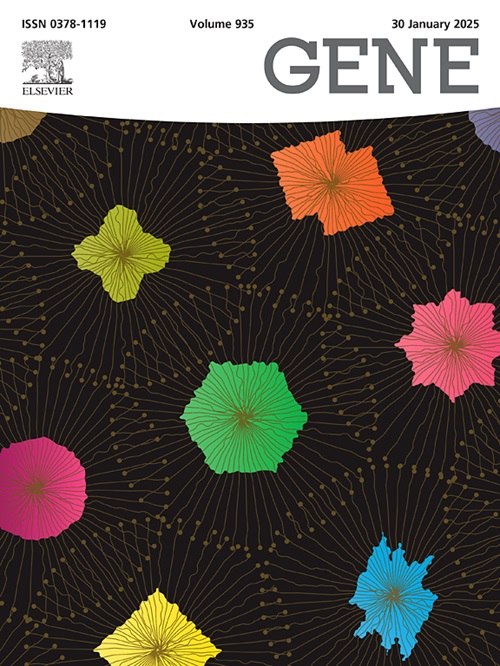Association of adiponectin and fat mass and obesity genetic variants with breast cancer risk in Egyptian females
IF 2.4
3区 生物学
Q2 GENETICS & HEREDITY
引用次数: 0
Abstract
Background
Breast cancer (BC) remains the most common cause of cancer-related mortality in women worldwide, driven by a combination of genetic predisposition and environmental influences. Obesity is a major modifiable risk factor, and recent studies have implicated genetic variants in the Adiponectin (ADIPOQ) and Fat Mass and Obesity-associated (FTO) genes in increasing the risk of both obesity and breast cancer across various populations.
Objective
This study investigates the association between ADIPOQ rs2241766 and FTO rs9939609 polymorphisms with BC risk and clinicopathological features in Egyptian women.
Methods
A case-control study was conducted on 192 female participants (96 BC patients and 96 age- and sex-matched healthy controls). Genotyping was performed using TaqMan real-time PCR assays. serum levels of ADIPOQ, FTO, carcinoembryonic antigen (CEA), and cancer antigen 15-3 (CA15-3) was carried out using enzyme-linked immunoassay techniques. Clinical data were also analyzed.
Results
The TG and GG genotypes, as well as the G allele of ADIPOQ rs2241766, were significantly associated with increased BC risk (OR = 2.300 and 4.836, respectively; p < 0.05). The G allele was associated with younger age and hormone receptor–positive subtypes. Similarly, the TA and AA genotypes and A allele of FTO rs9939609 were significantly associated with increased BC risk (OR = 4.423 and 7.656, respectively; p < 0.001). BMI was significantly higher among BC patients (p < 0.001), highlighting the potential interaction between genetic and metabolic risk factors.
Conclusion
The ADIPOQ rs2241766 and FTO rs9939609 polymorphisms are significantly associated with elevated BC risk in Egyptian women. These variants may serve as genetic markers for susceptibility, supporting their integration into personalized risk assessment and prevention strategies, especially in populations with high obesity prevalence.
脂联素、脂肪量和肥胖基因变异与埃及女性乳腺癌风险的关系
在遗传易感性和环境影响的共同作用下,乳腺癌(BC)仍然是全球女性癌症相关死亡的最常见原因。肥胖是一个主要的可改变的危险因素,最近的研究表明,在不同人群中,脂联素(ADIPOQ)和脂肪量与肥胖相关(FTO)基因的遗传变异增加了肥胖和乳腺癌的风险。目的探讨ADIPOQ rs2241766和FTO rs9939609多态性与埃及女性BC发病风险和临床病理特征的关系。方法对192名女性进行病例对照研究(96例BC患者和96例年龄和性别匹配的健康对照)。采用TaqMan实时PCR法进行基因分型。采用酶联免疫分析法测定血清ADIPOQ、FTO、癌胚抗原(CEA)和癌抗原15-3 (CA15-3)水平。并对临床资料进行分析。结果TG和GG基因型以及ADIPOQ rs2241766的G等位基因与BC风险增加显著相关(OR分别为2.300和4.836;p < 0.05)。G等位基因与年龄较小和激素受体阳性亚型相关。同样,TA和AA基因型以及FTO rs9939609的A等位基因与BC风险增加显著相关(OR分别为4.423和7.656;p < 0.001)。BC患者的BMI显著增高(p < 0.001),突出了遗传和代谢危险因素之间潜在的相互作用。结论ADIPOQ rs2241766和FTO rs9939609多态性与埃及女性BC风险升高显著相关。这些变异可以作为易感性的遗传标记,支持将其整合到个性化风险评估和预防策略中,特别是在高肥胖患病率人群中。
本文章由计算机程序翻译,如有差异,请以英文原文为准。
求助全文
约1分钟内获得全文
求助全文
来源期刊

Gene
生物-遗传学
CiteScore
6.10
自引率
2.90%
发文量
718
审稿时长
42 days
期刊介绍:
Gene publishes papers that focus on the regulation, expression, function and evolution of genes in all biological contexts, including all prokaryotic and eukaryotic organisms, as well as viruses.
 求助内容:
求助内容: 应助结果提醒方式:
应助结果提醒方式:


